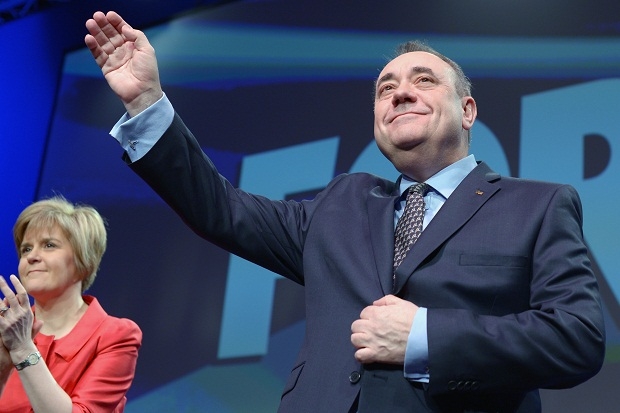When is a conference not a conference? When it’s a rally. Sitting in the hall listening to Alex Salmond this afternoon, it was hard to ignore the feeling that this SNP Spring Conference was about as far away from a party conference as it was possible to get. It really was a political rally – and quite a scary one too.
The warm-up acts for the Scottish First Minister consisted of folk singers from the Hebrides singing ‘it’s our country’ and a group of shouty actors putting on extracts from a pro-independence play which will premiere in Edinburgh this summer.
Then, when one of the actors had a clear go at the press for being unionist, the audience cheered with a vehemence and belligerence that was almost frightening – particularly for those of us sitting in the press seats as hundreds of angry eyes turned to seek us out.
It quickly became clear that Aberdeen’s conference centre this afternoon was not a place of debate but a venue for a rallying cry designed to send all those activists out on to the streets to work hard for the next five months.
But there was another sub-text to this event. SNP strategists know the referendum is in the hands of wavering Labour voters who may jump over to the Yes camp if they can be persuaded their future in the UK will be dominated by Tory governments.
This was the scenario which greeted Mr Salmond as he strode out to make his last set-piece conference speech before the referendum.
He is good when addressing his own party – but it would be hard not to be, given that he has led the SNP for a quarter of its existence.
He also knows which buttons to press and he did so with ease.
‘This is our moment to be a beacon of hope,’ he declared, ‘A land of achievement: our country, our Scotland, our independence.’
For the first part of the strategy – energising SNP activists – the First Minister used the usual tub-thumping rhetoric he is quite practised in.
‘The eyes of the world will be on Scotland in September: watching intently to see how we will vote,’ he said.
And he added: ‘When the polls are closed and the voting has been done, let’s resolve this: let’s keep the eyes of the world on Scotland, not to see how we are voting but to watch in admiration at what we will be building.’
For the second part – the courting of the Labour vote – Mr Salmond went on to more unfamiliar ground.
He even raised the prospect of Labour beating the SNP to form the first government in an independent Scotland.
‘This referendum is not about this party or this First Minister or even the wider Yes campaign: it’s about putting Scotland’s future in Scotland’s hands.
‘A Yes vote in September is not a vote for an SNP government in 2016, it’s a vote for a government in Scotland that the people of Scotland choose, pursuing policies the people of Scotland support.’
And he added: ‘That may be the SNP, it may be Labour, it may be a coalition but I tell you what it won’t be, it won’t be a government led by a party with a single MP in Scotland.’
This last point – ‘a government led by a party with a single MP’ is worth commenting on. The Tories won 17 per cent of the votes and the Liberal Democrats 19 per cent. So the UK is governed by parties who drew 36 per cent of the vote in Scotland – far more than the 20 per cent the SNP garnered. Yes, the Westminster voting system left the Tories with one seat to the SNP’s six seats. But when it comes to national government, Tory and SNP support are far closer than Salmond likes to admit (see below).
Anyway, the separatists have narrowed the gap and cut the No camp’s lead to somewhere around ten points, but Mr Salmond and his SNP lieutenants know that this last bit, overtaking the No side, will be the hardest.
That is why he is pushing this divide-and-rule approach, trying to splinter the unionist vote by enticing Labour voters over to the Yes campaign.
This offer, this olive branch to Labour waverers was clearly there yesterday in the midst of all the passion and nationalist rhetoric.
And, as those wavering Labour voters are likely to decide this referendum, don’t be surprised if you hear it again and again and again before this campaign is, finally, over.






Comments